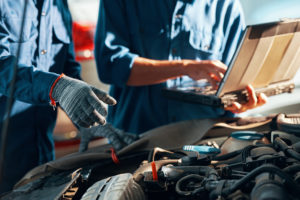
Calif. BAR: ‘Unreasonable’ fees in AB 2392 could be OK if shop proves it did the work
By onAssociations | Business Practices | Education | Insurance | Legal | Repair Operations
2018’s California Assembly Bill 2392 declared a series of fees “presumptively unreasonable,” but that doesn’t mean auto body shops can’t charge them, a Bureau of Automotive Repair regulator told repairers last week.
Following the bill’s signature into law last year, California Vehicle Code 22524.5 as of Jan. 1 holds:
(3) The following rates and fees are presumptively unreasonable:
(A) Administrative or filing fees, except those incurred related to documentation from the Department of Motor Vehicles and those related to the lien sale of a vehicle.
(B) Security fees.
(C) Dolly fees.
(D) Load and unload fees.
(E) Pull-out fees.
(F) Gate fees, except when the owner or insurer of the vehicle requests that the vehicle be released outside of regular business hours.
BAR operations branch program manager Matthew Gibson told the Glendale/Foothill chapter of the California Autobody Association on Wednesday the language doesn’t mean shops “don’t get paid for them.”
Such fees can “be rebutted by evidence,” he said.
For example, if a shop can prove it used a dolly to move a vehicle, it can rebut that its dollying fee was unreasonable, he said.
Asked during the gathering if a shop needed authorization to dolly a vehicle, Gibson said any amount would need to be approved by a consumer.
“In our mind, the customer’s responsible for everything,” he said during an earlier discussion of storage charges. “That’s why you get them to authorize everything.”
California collision repairer Kye Yeung (European Motor Car Works) in an interview earlier last week raised another interesting point about “Administrative and filing fees” billed on total losses.
Yeung said insurers tend to lump technicians’ work here into the administrative costs category, but from an workman’s comp perspective, this was incorrect.
A body shop paid a certain amount of worker’s comp for a clerical worker under Classification 8810, he said. But the employees performing teardown or blueprinting to develop the repair plan demonstrating the vehicle merited totaling fell under a different classification, according to Yeung.
“It’s not administrative,” he said. “… A technician is creating that.”
WCIRB California even uses a similar example to explain the clerical designation:
“An automobile repair facility employs a bookkeeper to maintain financial records,” it writes. “This employee works primarily in the repair facility’s back office, but occasionally must enter the garage to retrieve paperwork and status reports on specific jobs. In this instance, the bookkeeper cannot be assigned to Classification 8810 because this employee must occasionally enter the garage and is exposed to hazards outside those of a strictly clerical office worker.”
Both estimators and and body technicians appear to fall under Classification 8393, according to WCIRB California.
An employer’s pure premium rate for 8810 clerical was $0.27 in 2019, according to WCIRB California. The pure premium for 8893 was $2.97.
Featured image: Work done to develop an estimate might bot be considered administrative for the purposes of workman’s comp in California. (DragonImages/iStock)
